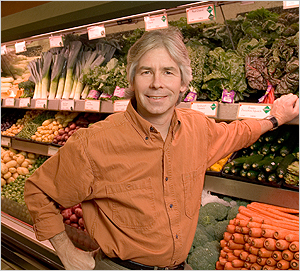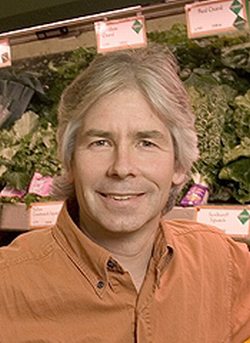Food, glorious food: Stanford’s first food summit
Food, glorious food: Stanford’s first food summit
” In preparing for my latest 1:2:1 podcast with health researcher Christopher Gardner, PhD, about Stanford’s first-ever food summit, I wondered: When did food become summitable? Weren’t summits grand, official events hosted by global leaders on geopolitics? Food. Isn’t food just sustenance?
 Well, it turns out, the Stanford Summit was tremendously successful. (More than 350 Stanford scholars attended from across the University’s seven schools.) Gardner will be hosting another food conclave in the fall to advance the discussion from the first session and to explore ways in which Stanford scholars can assist the local community on food issues.
Well, it turns out, the Stanford Summit was tremendously successful. (More than 350 Stanford scholars attended from across the University’s seven schools.) Gardner will be hosting another food conclave in the fall to advance the discussion from the first session and to explore ways in which Stanford scholars can assist the local community on food issues.
And now Gardner has helped me connect the dots in an interesting conversation about why we should all be thinking about food outside the, er, lunch box.
Think about it: Food is far more than fuel for our bodies. It’s a global conundrum pitting the haves against the have-nots. Global food prices are grossly inflated right now. Food trucked or flown hundreds or thousands of miles for the wealthy consumer is bad for the environment. Methane gases from huge industrialized animal farms further harm the atmosphere. The slow food movement is growing not only here in California but across the nation. Food and Society is now a course taught here at Stanford.
Food is political. Food has arrived. Time for lunch. “
Author: Paul Costello
Chief Communications Officer
Stanford School of Medicine – Communications & Public Affairs
###
 Christopher Gardner, PhD. Bio.
Christopher Gardner, PhD. Bio.
Christopher Gardner
Academic Appointments
Associate Professor (Research), Medicine – Stanford Prevention Research
Member, Cancer Center
> Positions
1997-1999 Research Associate, Department of Medicine, Stanford University
1999-2001 Assistant Professor, Dept of Epidemiology and Prevention, UC Davis
2001-2007 Assistant Professor, Department of Medicine, Stanford University
2007-present Associate Professor, Department of Medicine, Stanford University
> Administrative Appointments
Education Committee, The Obesity Society (2009 – 2011)
Nutrition Committee, American Heart Association (2009 – 2011)
> Honors/Awards/Fellowships
1988 University of California Regents Fellowship
1989 Outstanding Teaching Assistant, Department of Nutritional Sciences
1994 AHA Fellow, 20th U.S. 10-day Seminar on Epidemiology & Prevention of CVD
1995-1997 American Heart Association Postdoctoral Training Grant Recipient
2003 Distinguished Honorary Award, San Jose State University Department of Nutrition
2005 Outstanding Teacher, SPRC, Department of Medicine
> Education/ Training
Colgate University, Hamilton, NY B.A. 1977-1981 Philosophy
University of California, Berkeley Ph.D. 1989-1993 Nutrition Science
Stanford University, California Post. Doc. 1993-1997 CVD Epidemiology
> Current Research Interests
The role of nutrition and preventive medicine, with particular interests in: plant-based diets and phytochemicals; cardiovascular disease and cancer prevention; weight loss diets; clinical trials and epidemiology.
> Clinical Trials
Effects of Glutathione (an antioxidant) and N-Acetylcysteine on Inflammation
Adding Sleep Intervention to Traditional Diet and Exercise Approach to Weight Loss
Effect of Fish Oil on Plasma Triglycerides in Adults
Effects of Dietary Antioxidants on Cardiovascular Risk Factors
Effects of Omega-3 Fatty Acids on Markers of Inflammation
Effects of Raw vs. Other Milk Sources on Lactose Digestion
* The above story is adapted from materials provided by Stanford University School of Medicine
________________________________________________________________
![]()




















